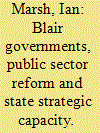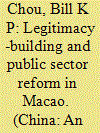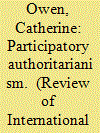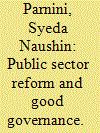| Srl | Item |
| 1 |
ID:
086969


|
|
|
|
|
| Publication |
2009.
|
| Summary/Abstract |
Two books at the end of the Blair era-by Michael Barber and Julian Le Grand-offer to redeem the 'third way'. Both authors explore the political case for public sector reform and the means by which it can be accomplished. They explore a similar range of reform models: command and control; quasi-markets; and devolution and transparency. But the circle between efficiency, client service and continuous improvement must be squared. Neither author considers the 'learning by doing' alternative. No less fundamentally, neither author addresses the political and technical challenges in developing strategy. How are issues to be aired in advance so as to expose evidence and perspectives? How are interests to be engaged and supporting coalitions formed? How are these processes to occur without executive commitment? How are unconventional ideas to be aired without being over-ruled by populist or media sensationalism? These are the practical dilemmas that confounded Blair's efforts. These books invite a strategic conversation that is badly needed. But where in the political system can it be pursued?
|
|
|
|
|
|
|
|
|
|
|
|
|
|
|
|
| 2 |
ID:
153574


|
|
|
|
|
| Summary/Abstract |
In this article we examine the politics of state-owned enterprise (SOE) reform in South Korea, specifically the privatization of Korea Electric Power Corporation. We focus on the policymaking process among government agencies and actors involved in SOE reform. The policy actors are identified, as are their preferences—efficiency versus the public good—and the strategies adopted to pursue them. The case illustrates how a particular SOE reform policy can take a long time to work through as each stakeholder attempts to pursue its preferences using various political ideologies and strategies in ever changing social, economic, and political environments. We present the lessons of the case for SOE reform.
|
|
|
|
|
|
|
|
|
|
|
|
|
|
|
|
| 3 |
ID:
116563


|
|
|
|
|
| Publication |
2012.
|
| Summary/Abstract |
Public sector reform has been an important strategy for the Macao government to build up its legitimacy since the handover of sovereignty. This article outlines the background of the legitimacy crisis that can be traced back to the administrative problems during the colonial era. Public sector reform in the post-handover era can be divided into two phases. Remarkable legitimacy-building was evident during the first phase of the reform that focused on the technicality of administrative efficiency and work performance. With a looming crisis of legitimacy in 2006, the Macao government continued to rely on the reform of the technical aspects of the administration by taking the approach of wider public consultation in the second phase of the reform. What have been left unreformed are the institutional shortcomings that hold back public participation and weaken the autonomy of public administration. The cause of the legitimacy crisis starting in the mid-2000s was the failure to introduce wider public involvement in public affairs and the maintaining of limited administrative autonomy. The path dependence of the second phase of the reform can hardly tackle the key factors of the new legitimacy crisis.
|
|
|
|
|
|
|
|
|
|
|
|
|
|
|
|
| 4 |
ID:
143570


|
|
|
|
|
| Summary/Abstract |
The disappointing performance of conventional public sector reforms in developing countries has led to the rise of ‘new’ approaches seeking to overcome traditional bureaucratic barriers to change: leadership-focused interventions like the Africa Governance Initiative (AGI); accountability-focused initiatives like the Open Government Partnership (OGP); and adaptation-focused models like those of Africa Power and Politics (APP). While these approaches are appealing to aid donors in their promise to move beyond the limitations of purely formal institution building, they fail to provide new answers to the ‘old’ analytical and practical challenges of public sector reform, in particular administrative patrimonialism, public corruption and political capture. The evidence is yet inchoate, but all points to the need for these approaches to work together with conventional ones. Beyond novel implementation tactics, however, there is a need for new strategies of sustained political support for embattled reformers who face powerful incentives against institutional change.
|
|
|
|
|
|
|
|
|
|
|
|
|
|
|
|
| 5 |
ID:
175532


|
|
|
|
|
| Summary/Abstract |
This article explores the way in which Russian and Chinese governments have rearticulated global trends towards active citizenship and participatory governance, and integrated them into pre-existing illiberal political traditions. The concept of ‘participatory authoritarianism’ is proposed in order to capture the resulting practices of local governance that, on the one hand enable citizens to engage directly with local officials in the policy process, but limit, direct, and control civic participation on the other. The article explores the emergence of discourses of active citizenship at the national level and the accompanying legislative development of government-organised participatory mechanisms, demonstrating how the twin logics of openness and control, pluralism and monism, are built into their rationale and implementation. It argues that as state bureaucracies have integrated into international financial markets, so new participatory mechanisms have become more important for local governance as government agencies have lost the monopoly of information for effective policymaking. Practices of participatory authoritarianism enable governments to implement public sector reform while directing increased civic agency into non-threatening channels.
|
|
|
|
|
|
|
|
|
|
|
|
|
|
|
|
| 6 |
ID:
077317


|
|
|
| 7 |
ID:
091958


|
|
|
|
|
| Publication |
2009.
|
| Summary/Abstract |
Developing countries relying on the assistance of donors have become particularly prone to imposed conditions of aid in the form of requirements on specific reform strategies to ensure good governance. Donors or multilateral agencies have taken leading roles in defining good governance. The donors began to impose good governance conditions on provisions of debt relief and new loans or grants in Bangladesh in the 1990s. They widened conditionality to include transparent administration, the protection of human rights and democracy, as well as public sector reform in Bangladesh. The World Bank made issues of corruption a major element in its governance agenda in Bangladesh. Global pressures to cooperate and compete, rising expectations of citizens and the need to reduce public deficits are changing the way Bangladesh needs to be governed.
|
|
|
|
|
|
|
|
|
|
|
|
|
|
|
|
| 8 |
ID:
178378


|
|
|
|
|
| Summary/Abstract |
This article analyses the challenges of open and expansive unionism in the era of public sector reform in Zambia. A sample of 20 former and current leaders of the Civil Servants and Allied Workers Union of Zambia was engaged in the research. The research reveals that trade unions in poor countries like Zambia are more vulnerable to the challenges of open and expansive unionism. These include inter-union conflict and lack of resources for union organising. Despite their vulnerability, these unions make strategic choices to deal with these challenges. Their strategies include networking and information gathering and sharing.
|
|
|
|
|
|
|
|
|
|
|
|
|
|
|
|
| 9 |
ID:
167068


|
|
|
|
|
| Summary/Abstract |
The acknowledgement of politics and institutions in developing countries is well in line with debates not only in the area of development effectiveness but also regarding new public management. Results-Based Approaches (RBApps), conceptually framed within these two debates, are designed to support outcome- and impact-oriented development goals. They link the achievement of results to monetary and/or non-monetary reward mechanisms. However, so far, development cooperation partners have mainly applied RBApps in the form of Results-Based Finance and Results-Based Aid. Through the provision of a conceptual framework, this paper embeds RBApps between different tiers of government within the discussion and applies Rwanda as a case study to it. Along the lines of Rwanda’s Domestic Performance Approach Imihigo, the article argues that development co-operation should be more proactive in considering these approaches, as they might be crucial in terms of sustainability and serve as a promising entry point for programmes supported by development partners.
|
|
|
|
|
|
|
|
|
|
|
|
|
|
|
|